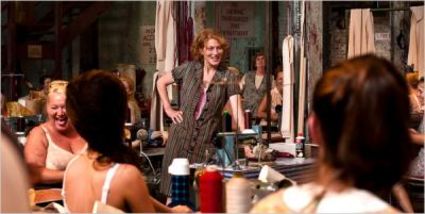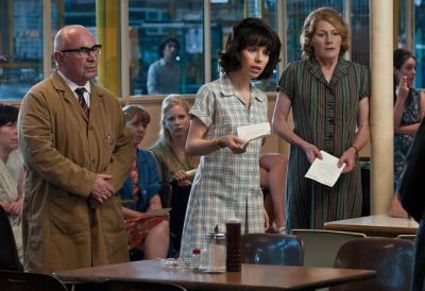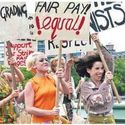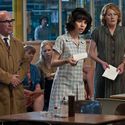Made In Dagenham
November 6, 2010
Empowering! Inspirational! Sally Hawkins is entrancing. Miranda Richardson is the icing on the cake. Bob Hoskins is deliciously fun. The human spirit captured on the screen in each character is uplifting and energizing. What am I talking about you ask? None other than MADE IN DAGENHAM - director Nigel Cole's spotlight on yet another group of courageous brave women who have made a difference. Cole previously brought us the ebullient "Calendar Girls" based on the true story of a group of post 50 and 60 year old women who posed nude for a calendar in an effort to raise money for veterans in England. Now, he turns his sites to the labor force a la Martin Ritt's "Norma Rae" but with a stronger ensemble cast, outstanding performances and light comedic touches that only add to the movie-going experience and one's appreciation for the historical facts and the importance of the ladies in Dagenham.
MADE IN DAGENHAM is a dramatization of the 1968 strike by the 187 female workers at the Ford Motor Company plant in Dagenham, England. Tired of being discriminated against in their pay and job classifications because they were "women" performing "unskilled labor", these women walked off the job, bringing Ford production in Britain to a standstill, and catching the attention of Britain's Labour Secretary, Barbara Castle, one of the world's great glass ceiling smashers. It was also through the efforts of these women that the Equal Pay Act of 1970 was ultimately enacted in Britain.
Rita O'Grady is a quiet, unassuming young mother who takes pride in her family and pride in her work. A seamstress at the Ford plant, she is one of the 187 women who stitch together the leather interiors for the various vehicles. Requiring skill, attention to detail and speed, Rita and her co-workers are an integral part of the production line. While the corporate bigwigs and plant managers poo-poo the contributions and talent of the women, Shop Steward Albert is the complete opposite. Raised by a single mother, he has great appreciation for the work that women do - both in the workplace and at home - and he encourages them to have a voice. During union contract negotiations and realizing the women aren't getting a fair shake, Albert becomes more than a fairy godfather as he gives a "gentle" prod to the women to fight for what's right. And that little bit of encouragement is all it takes for Rita, normally so quiet and sheepish, to find her voice, a voice that helps champion the women forward.

Believing that actions do speak louder than words, Rita and her fellow females hit the picket line, but not without a consequence. With a mindset that walking out will make the corporate heads do the right thing and end the strike quickly, the women quickly realize just how much inner fortitude and conviction "the right thing" mandates. With the strike dragging out for weeks and into months, minimal strike pay, husbands and children getting cranky and management not budging, just how long will it take for one side or the other to give in. And while everyone's money is on the girls giving it up first, boy are they in for a surprise.
Sally Hawkins is outstanding as Rita. An amalgamation of several of the actual Dagenham ladies, Hawkins' Rita truly transforms emotionally and physically from a nervous Nellie to the Mouse That Roared. Bringing this great level of nervousness to her physicality and speech pattern, Hawkins' metamorphosis of Rita moves with a deliberate nuanced pace in tandem with Rita's internal questioning of herself, prompted of course by Bob Hoskins' Albert Passingway. As the voice gets louder and more confident, she stands straighter; she strides when she walks; that nervous edge in her voice disappears; she stops looking at the floor. And then, in the blink of an eye, Hawkins adds a sweetness to the strength that throws Rita's opposition off guard, giving new meaning to the terms "feminine wiles." And at Rita's lowest point as a human being, let alone a woman, Hawkins digs even deeper and finds the loudest voice of all - in her heart. Please tell me someone is going to submit Hawkins for Academy consideration for this performance!

Having interviewed Hawkins several times, what I love and appreciate about her is the research and dedication she puts into each performance (a fact which she has told me, she credits to her parents) . She is always transformative, embodying the spirit of the character and of the time and carrying that into the physical mannerisms and dilect/diction. No matter the character, Hawkins' work is always rooted in reality and life and here is no different.
Miranda Richardson steals each of her scenes with her portrayal of Barbara Castle. Richardson, always one to play strong women, has not only a commanding ease of her character and the performance, but great wry comedic flair which escalates the import and impact of the final act. Bob Hoskins, who we see too little of nowadays, gives Albert a heart as big as the ocean. With a strong shyness, Hoskins' Albert is the moral compass of the story.

Although I thoroughly enjoy her performance, disappointing is the limited screen time of Rosmund Pike. As Ford plant wife, Lisa, she is a pivotal character, yet her on screen appearances left me with a sense that some of her part was left on the cutting room floor. The sub-plot involving Lisa felt as if it had some loose ends, with the character conveniently just "popping up" at school, circulating a petition, a dinner encounter, a quick visit to Rita's house, when, in fact, Lisa is the catalyst for the ultimate payoff.
As Rita's husband Eddie, Daniel Mays is charming. Slightly clownish, but endearing and adorable. And Geraldine James' Connie brings that mature life-experience to her character, serving well as a passing of the torch so-to-speak from Connie to Rita. Interesting is how the women themselves more or less had their own "class system", choosing leaders and spokespeople based on inner strength and not outward appearance. The choices these women made were clearly enunciated in the film as stemming from reason and conviction not from a popularity contest. And what would a reality based film involving the corporate world be without some comedic fodder at the hands of management. Here, that comic relief comes not only with the buffoonish under-secretaries to Labour Secretary Castle but also with Richard Schiff as Ford's Robert Tooley. Schiff really makes Tooley a real "tool."
 http://www.dental50plus.com/143 #6258">
http://www.dental50plus.com/143 #6258">I am sure that many will compare MADE IN DAGENHAM to "Norma Rae", but I have to tell you, MADE IN DAGENHAM is far superior. Written by William Ivory, the script is inscrutable. Notable are the unification issues addressed in the film and their portrayal. Class distinction disappears as women bond in public from town to town, reaching its apex with the involvement and decisiveness of Richardson's Barbara Castle. The entire construction of the film emphasizes equality on every level - not just the issue at hand in Dagenham of equal pay. What I would have liked to see more of though (and I have to believe it was also an issue during union negotiations), was addressing the deplorable working conditions in the factory. Out-dated sewing machines, sweatshop conditions, leaking ceilings. I can't imagine that didn't come into play during the actual strike as well as be used as a leverage with the pay demands.
As he did with "Calendar Girls", Nigel Cole celebrates the strength and importance of women (having been raised primarily by his mother and with strong women at home, he has a great affinity for them) in the world and in history. The stories he selects based on true events are fascinating to watch unfold and all educate and inform while entertaining. Plucking them from obscurity , Cole shines a brilliant light on women with heart, strength and conviction; those that shoulder on and find inner strength that is often lost in the shuffle of society and day-to-day life. MADE IN DAGENHAM is no different. His attention to authenticity is essential to the heart of this story and he succeeds brilliantly.
Visually, the film is meticulous. Crisp. Clean. Period perfect; an aged, period cinematic feel. Wonderful blend of B&W "news film" with the film proper. John de Borman - one of my all time fave cinematographers - is a master at period pieces and works well with lighting to punctuate color and texture for mood. His framing here is both expansive but intimate, adding to the fact that the issue at hand is of such a personal nature that affects everyone in different ways.
And you don't get much better with production design that Andrew McAlpine who really celebrates in his design, the energy and enthusiasm of these everyday working women. Wonderful contrast of design between the factory, wardrobe and exteriors. And the wardrobe is not only primarily vintage, but ideal.
As for the soundtrack - perfect.
A woman's work is never done. Be it at home or in the workplace, it takes a woman to move a mountain - or Ford Motor Company. MADE IN DAGENHAM - made for the women who made, and still make, our world.
Sally Hawkins - Rita O'Grady
Miranda Richardson - Barbara Castle
Bob Hoskins - Albert Passingway
Rosamund Pike - Lisa Hopkins
Daniel Mays - Eddie O'Grady
Directed by Nigel Cole. Written by William Ivory















Reader Comments(0)